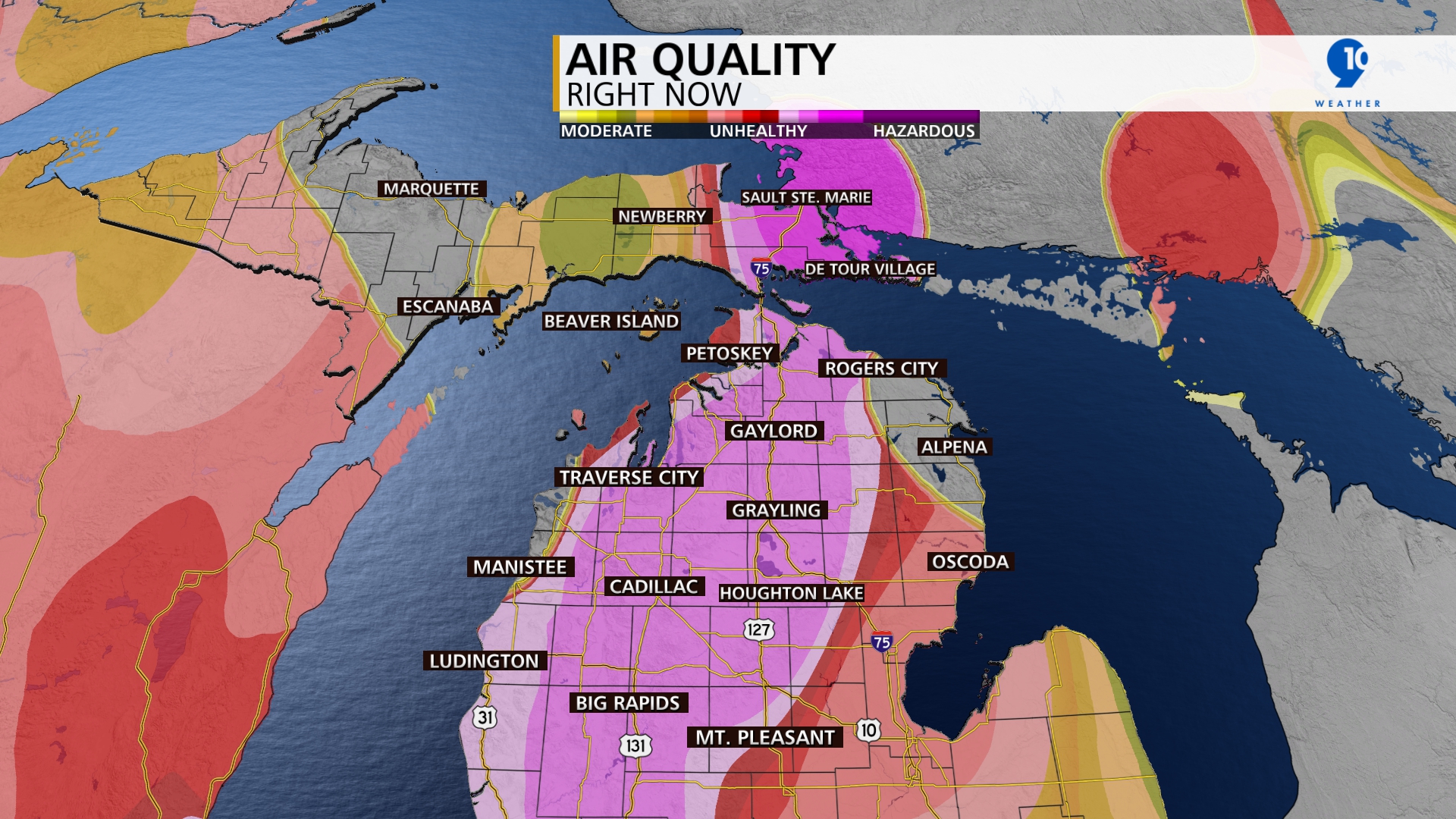Several large wildfires in Canada are causing poor air quality as the smoke moves into the region from the winds on the back side of the low-pressure system moving east.
On June 27, the Michigan Department of Environmental, Great Lakes, and Energy (EGLE) issued a statewide air quality alert, due to the amount of small particles in the air from the smoky haze.
The small particles, referred to as PM 2.5, can be breathed in. The higher amounts that will be in the air during the air quality alert can cause health problems for those with existing heart and lung issues.
Dan Thorell, a Health Officer from the Health Department of Northwest Michigan says, “While the current situation does not warrant panic, it is important that we inform Northwest Michigan residents to take precautions, especially older adults, children, and people who are pregnant or have lung and heart conditions.”
RELATED: Bad air quality impacts local farming family
Anyone can get sick from high levels of wildfire smoke. It is best to stay inside with doors and windows closed. Use good air filtration for heating and cooling, such as MERV-13 or better. A portable air filter unit is also good.
Air quality in Antrim, Charlevoix, Emmet, and Otsego counties is rated as “Very Unhealthy for Everyone,” with a couple of locations reaching “Hazardous for Everyone,” based on the PM 2.5 index. Other areas of the state are also in the unhealthy range, as indicated on our Doppler 9&10 Weather map. The weather team says the worst conditions are expected to shift east as the back side of the low-pressure moves and winds change direction.
Below are the levels of air quality provided by AirNow:
Very Unhealthy for Everyone air quality for PM 2.5 index of 201 – 300
All people should avoid long or intense outdoor activities. People with heart or lung disease, older adults, children and teenagers, minority populations, and outdoor workers should avoid all physical outdoor activities. Reschedule outdoor activities or move them indoors. Watch for symptoms such as coughing or shortness of breath. For people with asthma, follow your action plan and keep quick relief medicine handy. For people with heart disease, symptoms such as palpitations, shortness of breath, or unusual fatigue may indicate a serious problem. If you have any of these, contact your healthcare provider.
Hazardous for Everyone air quality for PM 2.5 index of 301 – 500
All people should avoid all physical activities outdoors. People with heart or lung disease, older adults, children and teenagers, minority populations, and outdoor workers should remain indoors and keep activity levels low. Watch for symptoms such as coughing or shortness of breath. For people with asthma, follow your action plan and keep quick relief medicine handy. For people with heart disease, symptoms such as palpitations, shortness of breath, or unusual fatigue may indicate a serious problem. If you have any of these, contact your health care provider.
Moderate air quality for particulate matter (PM) 2.5 Index of 51- 100
Those who are unusually sensitive to particle pollution should consider making outdoor activities shorter and less intense. Watch for symptoms such as coughing or shortness of breath. These are signs to take it easier. For everyone else, it’s a good day to be outside.
Unhealthy for Sensitive Groups air quality for PM 2.5 index of 101 - 150
People with heart or lung disease, older adults, children and teenagers, minority populations, and outdoor workers should make outdoor activities shorter and less intense. It’s okay to be active outdoors but take more breaks. Watch for symptoms such as coughing or shortness of breath. For people with asthma, follow your action plan and keep quick relief medicine handy. For people with heart disease, symptoms such as palpitations, shortness of breath, or unusual fatigue may indicate a serious problem. If you have any of these, contact your health care provider.
Unhealthy for Everyone air quality for PM 2.5 index of 151 - 200
All people should reduce long or intense outdoor activities and take more breaks. People with heart or lung disease, older adults, children and teenagers, minority populations, and outdoor workers should avoid long or intense outdoor activities. Consider rescheduling or moving activities indoors. Watch for symptoms such as coughing or shortness of breath. For people with asthma, follow your action plan and keep quick relief medicine handy. For people with heart disease, symptoms such as palpitations, shortness of breath, or unusual fatigue may indicate a serious problem. If you have any of these, contact your health care provider.
It is important to know that with shifting atmospheric conditions, the air quality levels can also change quickly. See the current conditions here.
RELATED: Hazy Skies Continue to Settle Over Northern Michigan


